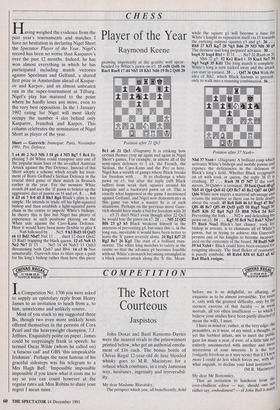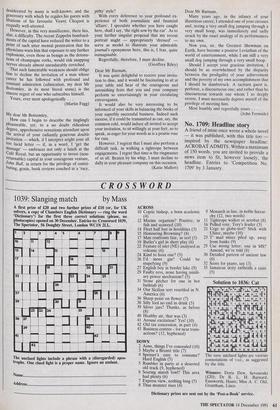11 YEAR OLD SCOTCH WHISKY
COMPETITION
cliAVAS REGAL
12 YEAR OLD SCOTCH WHISKY
The Retort Courteous
Jaspistos
I n Competition No. 1706 you were asked to supply an epistolary reply from Henry James to an invitation to lunch from a, to him, unwelcome and unlikely source.
Most of you stuck to my suggested three Bs, though two even more unlikely hosts offered themselves in the persons of Cora Pearl and the heavyweight champion, J.J. Jeffries. Exquisitely polite on paper, James could be surprisingly frank in speech: he termed Oscar Wilde (whom he called on) 'a fatuous cad' and GBS 'this unspeakable Irishman'. Perhaps the most famous of his graceful sidesteps was his telegram to a Mrs Hugh Bell: 'Impossible impossible impossible if you knew what it costs me to say so you can count however at the regular rates ask Miss Robins to share your regret I mean mine.' John Doxat and Basil Ransome-Davies were the nearest rivals to the prizewinners printed below, who get an authorial emolu- ment of f16 each. The bonus bottle of Chivas Regal 12-year-old de luxe blended whisky goes to M.R. Macintyre for a refusal which combines, in a truly Jamesian way, hesitancy, ingenuity and irreversibil- ity.
My dear Madame Blavatsky, The prospect which you, all beneficently, hold
before me is so delightful, so alluring, sa exquisite as to be almost irresistible. Yet resist it, only with the greatest difficulty, only by the sternest exercise of that faculty — in weak mortals, all too often insufficient — to which I believe your studies have been partly directed (I mean the will), I must. I have in mind or, rather, at the very edge, the penumbra, as it were, of my mind, a thought, as yet the feeblest infant, not to meet the puhlte gaze for many a year, if ever, of a little tale not entirely unconnected .with another and more mysterious of your interests. It is the fear (vulgarly frivolous as it may seem) that if I knew more I could do less which forces me, with ah., what anguish, to decline your kind invitation. (M.R. Macintyre)
My dear Mr Bottomley,
That an invitation to luncheon from the ever-ebullient editor — nay, should one n°1 rather say, embodiment? — of John Bull is much
desiderated by many is well-known; and the generosity with which he regales his guests with libations of his favourite Veuve Clicquot is eequally well-attested.
However, in this very munificence, there lies, alas, a difficulty. The recent Zeppelin bombard- ments of the capital have reduced the writer to a Point of such utter mental prostration that his physicians warn him that exposure to any further explosions, even those as benign as the detona- tions of champagne corks, would risk snapping nerves already almost unendurably stretched. That such lamentable weakness should oblige him to decline the invitation of a man whose career he has followed with profound and constant admiration (admiration, my dear Mr Bottomley, in its most literal sense) is the sincere regret of one who subscribes himself. Yours, ever most apologetically . . .
(Martin Fagg) My dear Mr Bottomley, How can I begin to describe the tinglingly pleasurable, yet, to a no doubt ridiculous degree, apprehensive sensations attendant upon the arrival of your radiantly generous double Invitation — which, if I interpret aright your all too lucid letter — if, in a word, I 'get the message' — embraces not only a lunch at the Cafe Royal, but an opportunity to invest (non- returnable) capital in your courageous venture, John Bull, in return for the privilege of contri- buting, gratis, book reviews couched in a 'racy, pithy' style?
With every deference to your profound ex- perience of both journalistic and financial 'affairs', I speculate whether you have caught here, shall I say, 'the right sow by the ear'. As to your further singular proposal that my recent portrait might — appropriately 'dressed' serve as model to illustrate your admirable journal's eponymous hero, this is, I fear, quite inimaginable.
Regretfully, therefore, I must decline. (Geoffrey Riley) Dear Mr Barnum, It was quite delightful to receive your invita- tion to dine, and it would be fascinating to sit at your table and hear of the courageous and astonishing feats that you and your company perform so entertainingly in your circulating extravaganza.
It would also be very interesting to be informed of your skills in balancing the books of your superbly successful business. Indeed such success, if it could be transmitted as can, say, the common cold, would induce all invited to accept your invitation, to sit willingly at your feet, so to speak, as eager for your words as is a prairie rose for rain.
However, I regreat that I must also perform a difficult task, in walking a tightrope between engagements. I regret that time is the ringmaster of us all. Beaten by his whip, I must decline to daily in your pleasant company on this occasion.
(Katie Mallett) Dear Mr Barnum, Many years ago, in the infancy of your illustrious career, I attended one of your circuses and, seeing a very small dog jumping through a very small hoop, was immediately and sadly struck by the exact analogy of its performances to my own.
Now you, sir, the Greatest Showman on Earth, have become a positive Leviathan of the world of entertainment, while I am still a very small dog jumping through a very small hoop.
Should I accept your gracious invitation, I should be so overwhelmed by the disparity between the prodigality of your achievement and the poverty of my own accomplishment that I should be dumbstruck. A taciturn guest is, perforce, a discourteous one; and rather than be discourteous towards one whom I so deeply revere, I must necessarily deprive myself of the privilege of meeting him.
Most humbly and regretfully yours . . . (John Fernside)



































































 Previous page
Previous page